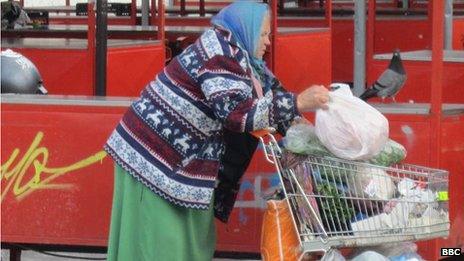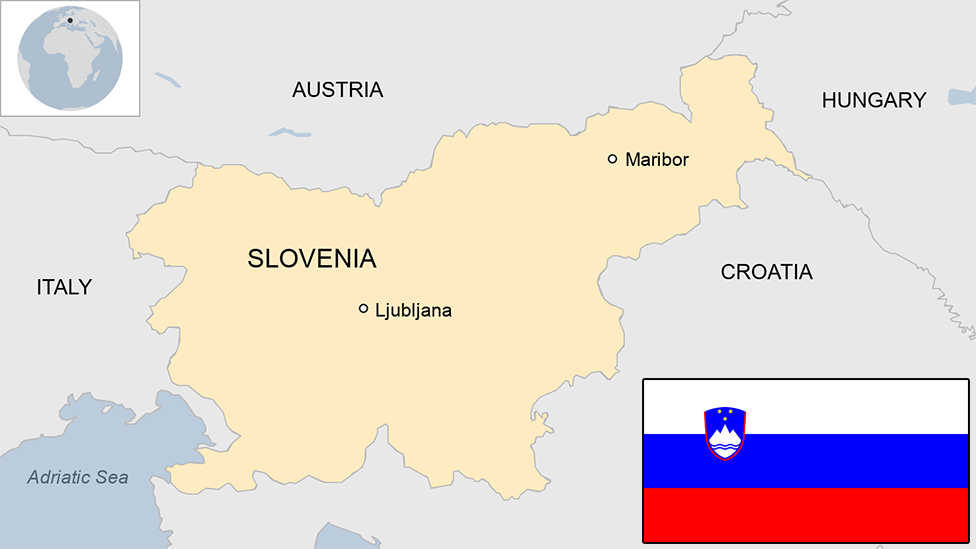Slovenia seeks to dismiss 'another Cyprus hysteria'
- Published

Many Slovenes are now less optimistic about the country's economic prospects than ever before
Shaken by international media speculation that Slovenia might follow Cyprus in applying for a large EU and IMF-led bailout, Slovene bankers, business leaders and politicians have closed ranks to dismiss what they regard as "hysteria".
"Slovenia does not need to fear," says Janko Medja, head of Nova Ljubjanska Banka.
"There are very good fundamentals. We simply need to take a couple of decisions that may be hard for some people, but which allow us to make good progress in the next couple of years. And I think we can do that."
However, each day more details emerge about the plans they are drawing up to get the country out of its current mess.
The measures look set to include a 2% rise in VAT, the privatisation of a large state-owned company, possibly Telekom Slovenije, and the setting up - already started - of a so-called "bad bank" where non-performing loans will be isolated.
A stability plan will be delivered to the European Commission by the end of April.
The mess, they admit, is bad.
'Casino capitalism'
"One-third of Slovene companies have serious problems, and quite a few will collapse in the next months or year," says Samo Hribar Milic, who heads the Slovene Chamber of Commerce and Industry.
Debts are mainly owed by companies, rather than individuals.
According to a list published at the end of last month, 4,500 companies owe some 580m euros (£492m; $745m).
At the end of last year, the "bad bank" was established by the outgoing government.
Officially known as a Bank Asset Management Company (BAMC), on the recommendation of the IMF it will also have international figures on its board, to increase its credibility in a small country where the ties between bankers and businessmen are usually tight.
Around one-fifth of the loans issued by the country's top three banks are non-performing, according to an IMF report issued in March.
The majority state-owned banks will be shored up by the state, with the bad loans transferred either to a bad bank within each good bank, or to the central agency.
That money looks set to be recouped by privatisations.
In Slovenia, 40% of the economy is state-owned - by far the highest figure in the region. Fierce disputes can be expected over what to privatise, in a country which owes much of its success to keeping multinationals out.

The standards of living in Slovenia are still far higher than in most of eastern Europe
Many of the non-performing loans date to the period after Slovenia joined the euro in 2007 - the first former communist country to do so. Slovene banks borrowed money abroad cheaply, and bought up branches of banks in former Yugoslav countries like Serbia and Montenegro.
Jose Mencinger, an economist and former economy minister, estimates Slovenia's total debt at 10bn euros.
He blames what he calls "the greed" of the financial sector - rather than the much-criticised public sector - for Slovenia's problems.
"We suddenly felt that we are rich and that we can gamble in the casino, so we introduced casino capitalism also in Slovenia."
'Our opportunity'
The Slovene retail chain Mercator bought many stores in ex-Yugoslav states, expecting the standard of living to rise as their countries got closer to EU membership.
Even the Slovene Catholic Church could not resist the temptation to get rich quick, setting up its own investment fund.
The picture is by no means all grim.
"Two-thirds of Slovene companies are performing reasonably well," stresses Mr Milic.
"Ours is an export-driven economy - unlike Cyprus. In a circle of 600km (372 miles) from Ljubljana, live more than 100 million people - the whole of northern Italy, Switzerland, Austria, and Germany - and that's our opportunity."
The only thing Slovenia has in common with Cyprus, he adds, is its standard of living. The average wage in both countries is around 14 euros an hour - far higher than in most of eastern Europe.
Many of Slovenia's most successful companies export vehicle parts.
Akrapovic, with three factories, employs 600 people making high-quality titanium exhaust pipes for motorbikes and sports cars. Their sales continue to soar, but their staff are not immune to the general sense of gloom.
"Even if it doesn't immediately affect our business it may affect the morale of the staff," said Akrapovic sales manager Michel Neven.
"They read the news and see what's happening to their family and relatives. And we can feel it on the shop floor. People are less optimistic now than ever before, and they cling to their jobs."
The centre-right government of Janez Jansa was replaced in March by a new coalition led by Alenka Bratusek of Positive Slovenia - the country's first female prime minister.
"I don't believe that we can solve our current problems only by fixing banks; we must also restructure businesses," her finance minister Uros Cufer told the Slovene press agency STA this week.
"The bad bank can be used as a tool for both tasks."
- Published28 June 2023

- Published28 February 2013
